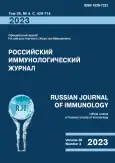Экспрессия рецептора IL-7 на Th1-, Th17-лимфоцитах у пациентов с псориатическим артритом
- Авторы: Блинова Е.А.1, Ангельская О.А.1, Козлов В.А.1
-
Учреждения:
- ФГБНУ «Научно-исследовательский институт клинической и фундаментальной иммунологии»
- Выпуск: Том 26, № 4 (2023)
- Страницы: 515-520
- Раздел: Школа Клинической Иммунологии "Сочи-2023"
- URL: https://bakhtiniada.ru/1028-7221/article/view/253435
- DOI: https://doi.org/10.46235/1028-7221-13982-EOI
- ID: 253435
Цитировать
Полный текст
Аннотация
Псориатический артрит (ПсА) – хроническое иммуноопосредованное воспалительное заболевание суставов, позвоночника и энтезисов, которое может наблюдаться у больных с псориазом. Распространенность псориатического артрита высока в России, в последние годы отмечается прирост заболеваемости. В основе патогенеза ПсА лежит активация Th1-, Th17-клеток, продуцируемые клетками провоспалительные цитокины участвуют в каскаде реакций, приводящих к деформации суставов и разрушению костной ткани.
Для некоторых аутоиммунных заболеваний, ассоциированных с Th1/Th17-ответом, обнаружена вовлеченность IL-7 в патогенетические механизмы. В том числе предполагается, что IL-7 может поддерживать аутореактивные Т-лимфоциты. Воздействие цитокина на клетки обеспечивается путем его связывания со своим рецептором, в результате происходит передача сигнала внутрь клетки и запуск процессов дифференцировки, пролиферации, продукции цитокинов. На экспериментальных животных моделях актоиммунных заболеваний показано, что применение блокирующих антител к α-цепи рецептора IL-7 (IL-7R) приводит к уменьшению воспаления в тканях и снижению числа инфильтрующих Т-лимфоцитов. Поэтому целью данной работы было исследовать in vitro влияние IL-7 и блокады α-цепи рецептора IL-7 на содержание Th1-, Th17-лимфоцитов и экспрессию субъединиц рецептора IL-7 на данных клетках в норме и при псориатическом артрите.
В исследование было включено 9 пациентов с ПсА в стадии обострения основного заболевания (средний возраст 44±6,5 года) и 6 условно здоровых доноров (средний возраст 45±2,7 лет). Влияние IL-7 и блокирующих моноклональных антител (aCD127) оценивали в культурах МНК периферической крови in vitro. Для определения экспрессии субъединиц рецептора IL-7 (CD127, CD132) и фенотипирования клеток периферической крови и культур использовали метод проточной цитофлуорометрии.
Впервые было показано, что у пациентов с ПсА увеличено число CD127+CD132- и CD127+CD132+ клеток среди Th17-лимфоцитов, а также CD127+CD132-, CD127+CD132+ и CD127-CD132+ клеток среди Th1-лимфоцитов, что может говорить об участии IL-7 в поддержании данных клеточных популяций. Под влиянием IL-7 в культуре как у доноров, так и у пациентов происходило увеличение содержания Th1-клеток и снижение числа Th17-клеток, и противоположный эффект наблюдался в условиях блокады IL-7R. Под воздействием IL-7, а также блокирующих антител происходило значимое снижение экспрессии CD127 на Th1-, Th17-лимфоцитах. Однако сокращение числа CD127-CD132+ среди Th1-, Th17-лимфоцитов происходило только в условиях блокады антителами. Т. е., несмотря на перераспределение Th1- и Th17-лимфоцитов в культуре, в условиях блокады клетки данных популяций не активировались. Полученные данные могут послужить основой для выбора рецептора IL-7 в качестве мишени при разработке таргетных препаратов для лечения ПсА.
Ключевые слова
Полный текст
Открыть статью на сайте журналаОб авторах
Елена Андреевна Блинова
ФГБНУ «Научно-исследовательский институт клинической и фундаментальной иммунологии»
Автор, ответственный за переписку.
Email: eablinova@niikim.ru
ORCID iD: 0000-0003-3327-3630
к.б.н., старший научный сотрудник лаборатории клинической иммунопатологии ФГБНУ «Научно-исследовательский институт клинической и фундаментальной иммунологии»
Россия, г. НовосибирскО. А. Ангельская
ФГБНУ «Научно-исследовательский институт клинической и фундаментальной иммунологии»
Email: anolga@mail.ru
аспирант лаборатории клинической иммунопатологии ФГБНУ «Научно-исследовательский институт клинической и фундаментальной иммунологии»
Россия, г. НовосибирскВ. А. Козлов
ФГБНУ «Научно-исследовательский институт клинической и фундаментальной иммунологии»
Email: vakoz40@yandex.ru
д.м.н., профессор, академик РАН, заведующий лабораторией клинической иммунопатологии ФГБНУ «Научно-исследовательский институт клинической и фундаментальной иммунологии»
Россия, г. НовосибирскСписок литературы
- Мишина О.С., Коротаева Т.В., Стародубов В.И., Насонов Е.Л. Заболеваемость псориатическим артритом в России: тенденции на современном этапе и перспективы // Научно-практическая ревматология, 2015. Т. 53, № 3. С. 251-257. [Mishina O.S., Korotaeva T.V., Starodubov V.I., Nasonov E.L. Incidence of psoriatic arthritis in Russia: Trends at the present stage and prospects. Nauchno-prakticheskaya revmatologiya = Rheumatology Science and Practice, 2013, Vol. 53, no. 3, pp. 251-257. (In Russ.)]
- Belarif L., Mary C., Jacquemont L., Mai H.L., Danger R., Hervouet J., Minault D., Thepenier V., Nerrière-Daguin V., Nguyen E., Pengam S., Largy E., Delobel A., Martinet B., Le Bas-Bernardet S., Brouard S., Soulillou J.P., Degauque N., Blancho G., Vanhove B., Poirier N. IL-7 receptor blockade blunts antigen-specific memory T cell responses and chronic inflammation in primates. Nat. Commun., 2018, Vol. 9, no. 1, 4483. doi: 10.1038/s41467-018-06804-y.
- Dooms H. Interleukin-7: Fuel for the autoimmune attack. J. Autoimmun., 2013, Vol. 45, pp. 40-48.
- Hartgring S.A., Willis C.R., Alcorn D., Nelson L.J., Bijlsma J.W., Lafeber F.P., van Roon J.A. Blockade of the interleukin-7 receptor inhibits collagen-induced arthritis and is associated with reduction of T cell activity and proinflammatory mediators. Arthritis Rheum., 2010, Vol. 62, no. 9, pp. 2716-2725.
- Lee L.F., Axtell R., Tu G.H., Logronio K., Dilley J., Yu J., Rickert M., Han B., Evering W., Walker M.G., Shi J., de Jong B.A., Killestein J., Polman C.H., Steinman L., Lin J.C. IL-7 promotes T(H)1 development and serum IL-7 predicts clinical response to interferon-β in multiple sclerosis. Sci. Transl. Med., 2011, Vol. 3, no. 93, 93ra68. doi: 10.1126/scitranslmed.3002400.
- Meyer A., Parmar P.J., Shahrara S. Significance of IL-7 and IL-7R in RA and autoimmunity. Autoimmun. Rev., 2022, Vol. 21, no. 7, 103120. doi: 10.1016/j.autrev.2022.103120.
- Seyfarth J., Mütze N., Antony Cruz J., Kummer S., Reinauer C., Mayatepek E., Meissner T., Jacobsen M. CD4+ T-cells with high common chain expression and disturbed cytokine production are enriched in children with type-1 diabetes. Front. Immunol., 2019, Vol. 10, 820. doi: 10.3389/fimmu.2019.00820.
- Stober C., Ye W., Guruparan T., Htut E., Clunie G., Jadon D. Prevalence and predictors of tumour necrosis factor inhibitor persistence in psoriatic arthritis. Rheumatology (Oxford), 2018, Vol. 57, no 1, pp. 158-163.
- Veale D.J., Fearon U. The pathogenesis of psoriatic arthritis. Lancet, 2018, Vol. 391, no. 10136, pp. 2273-2284.
- Wingender G., Kronenberg M. OMIP-030: Characterization of human T cell subsets via surface markers. Cytometry A, 2015, Vol. 87, no 12, pp. 1067-1069.
Дополнительные файлы







